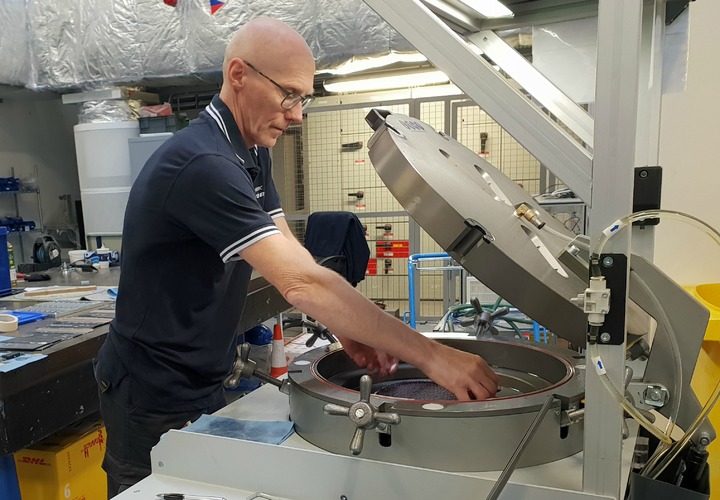Getting the measure with fast and accurate data
08 January 2019A 3D-permeability measurement bench that provides accurate data and fast processing of samples has been added to a stable of high-performing equipment at the AMRC Composite Centre thanks to the support of funding from the Aerospace Technology Institute (ATI). .
The EASYPERM permeability bench is manufactured by Institut de Soudure, an international technical centre specialising in long fibre reinforced composites, and allows for the standardisation of testing.
The innovative system is capable of measuring the permeability of a dry reinforcement. Evaluating permeability is important for understanding how liquid resin will behave when injected in infusion and RTM processes.
Steffan Lea, a research fellow at the AMRC Composite Centre, said: “What we get at the end is a measurement, a number that can be used in simulations that take a couple of minutes rather than several hours compared with if we were using other methods. By using sub-scale (coupons and computer simulation) testing to provide fast and accurate data, it cuts down on a trial and error approach, saving our research partners money, material and time.”
The system allows for the characterisation of resin flow in dry fibre reinforcements – crucial information for performing simulations of large and complex parts, and also for process optimisation in high production rates. It can be used to characterise all types of fibre including glass, carbon, aramid, flax and hemp and requires a minimal amount of material to perform the evaluation.
Steffan said the kit is the latest addition to a diverse and growing portfolio of equipment purchased with funding from the ATI whose aim is to ‘strengthen and grow the UK’s aerospace sector, safeguarding future jobs and economic contribution through substantial investment in technologies and capabilities’. This includes a braiding system, Jacquard loom, tailored fibre placement, a high temperature, high tension filament winder, tow-spreading machine and robotic end effectors for automated handling.
“Some of the key technical capabilities of the machine is that is has two configurations for permeability measurement - in-plane and through-thickness,” said Steffan. “It has up to five bar injection pressure and is coupon scale so you’re not wasting lots of material while you’re doing the testing, making efficient use of test material. It also works with any kind of fibre and the chamber is adjustable so we can vary the fibre volume fraction."
It has already been used on projects including testing for GE Aviation’s Digital Propulsion project and FabForm, a project for a textile manufacturer looking at the stabilisation of thick 3D woven fabric to create composite preforms for automotive and aerospace.
Steffan explained how it works: “Under the lid is a test chamber, inside which goes the test material – the coupon. You close the lid and inject a model fluid to replicate the resin – we use rapeseed oil - and as the pressure sensors inside the chamber are triggered, you can see how the oil flows through the material – so whether it flows in one direction more than another.
“A key factor for us is that EASYPERM is a commercially available piece of equipment so we can compare our results to others using the same methods and have certainty that the test is being conducted in a consistent manner. It is standardising testing.
“In composites, there is a tendency for people to develop their own in-house way of testing but with this it is standardised. What that means is that if a university in Australia for example has the same equipment, we could compare our results with theirs, whereas before we would have to get our own material and do the tests in our own way.”
The new ATI-funded raft of equipment will be used to not only to not only manufacture preforms but also develop enabling technology for commercialisation including joining, automation and impregnation.
Composite materials and processes are increasingly being used in aerospace to make aircraft lighter and more environmentally-friendly solutions and there are huge opportunities to adopt composites in many other industries in order to reap economic and environmental benefits.
Research undertaken with this equipment by the AMRC will bring down the cost of complex composite components, helping UK manufacturers to secure a larger share of the lucrative and rapidly-expanding aerospace and composite markets.

